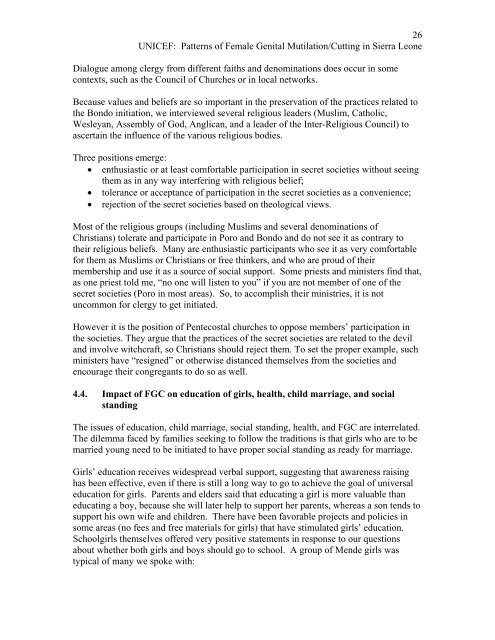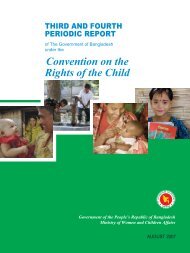Patterns of Female Genital Cutting in Sierra Leone - Unicef
Patterns of Female Genital Cutting in Sierra Leone - Unicef
Patterns of Female Genital Cutting in Sierra Leone - Unicef
Create successful ePaper yourself
Turn your PDF publications into a flip-book with our unique Google optimized e-Paper software.
26<br />
UNICEF: <strong>Patterns</strong> <strong>of</strong> <strong>Female</strong> <strong>Genital</strong> Mutilation/<strong>Cutt<strong>in</strong>g</strong> <strong>in</strong> <strong>Sierra</strong> <strong>Leone</strong><br />
Dialogue among clergy from different faiths and denom<strong>in</strong>ations does occur <strong>in</strong> some<br />
contexts, such as the Council <strong>of</strong> Churches or <strong>in</strong> local networks.<br />
Because values and beliefs are so important <strong>in</strong> the preservation <strong>of</strong> the practices related to<br />
the Bondo <strong>in</strong>itiation, we <strong>in</strong>terviewed several religious leaders (Muslim, Catholic,<br />
Wesleyan, Assembly <strong>of</strong> God, Anglican, and a leader <strong>of</strong> the Inter-Religious Council) to<br />
ascerta<strong>in</strong> the <strong>in</strong>fluence <strong>of</strong> the various religious bodies.<br />
Three positions emerge:<br />
enthusiastic or at least comfortable participation <strong>in</strong> secret societies without see<strong>in</strong>g<br />
them as <strong>in</strong> any way <strong>in</strong>terfer<strong>in</strong>g with religious belief;<br />
tolerance or acceptance <strong>of</strong> participation <strong>in</strong> the secret societies as a convenience;<br />
rejection <strong>of</strong> the secret societies based on theological views.<br />
Most <strong>of</strong> the religious groups (<strong>in</strong>clud<strong>in</strong>g Muslims and several denom<strong>in</strong>ations <strong>of</strong><br />
Christians) tolerate and participate <strong>in</strong> Poro and Bondo and do not see it as contrary to<br />
their religious beliefs. Many are enthusiastic participants who see it as very comfortable<br />
for them as Muslims or Christians or free th<strong>in</strong>kers, and who are proud <strong>of</strong> their<br />
membership and use it as a source <strong>of</strong> social support. Some priests and m<strong>in</strong>isters f<strong>in</strong>d that,<br />
as one priest told me, “no one will listen to you” if you are not member <strong>of</strong> one <strong>of</strong> the<br />
secret societies (Poro <strong>in</strong> most areas). So, to accomplish their m<strong>in</strong>istries, it is not<br />
uncommon for clergy to get <strong>in</strong>itiated.<br />
However it is the position <strong>of</strong> Pentecostal churches to oppose members’ participation <strong>in</strong><br />
the societies. They argue that the practices <strong>of</strong> the secret societies are related to the devil<br />
and <strong>in</strong>volve witchcraft, so Christians should reject them. To set the proper example, such<br />
m<strong>in</strong>isters have “resigned” or otherwise distanced themselves from the societies and<br />
encourage their congregants to do so as well.<br />
4.4. Impact <strong>of</strong> FGC on education <strong>of</strong> girls, health, child marriage, and social<br />
stand<strong>in</strong>g<br />
The issues <strong>of</strong> education, child marriage, social stand<strong>in</strong>g, health, and FGC are <strong>in</strong>terrelated.<br />
The dilemma faced by families seek<strong>in</strong>g to follow the traditions is that girls who are to be<br />
married young need to be <strong>in</strong>itiated to have proper social stand<strong>in</strong>g as ready for marriage.<br />
Girls’ education receives widespread verbal support, suggest<strong>in</strong>g that awareness rais<strong>in</strong>g<br />
has been effective, even if there is still a long way to go to achieve the goal <strong>of</strong> universal<br />
education for girls. Parents and elders said that educat<strong>in</strong>g a girl is more valuable than<br />
educat<strong>in</strong>g a boy, because she will later help to support her parents, whereas a son tends to<br />
support his own wife and children. There have been favorable projects and policies <strong>in</strong><br />
some areas (no fees and free materials for girls) that have stimulated girls’ education.<br />
Schoolgirls themselves <strong>of</strong>fered very positive statements <strong>in</strong> response to our questions<br />
about whether both girls and boys should go to school. A group <strong>of</strong> Mende girls was<br />
typical <strong>of</strong> many we spoke with:

















